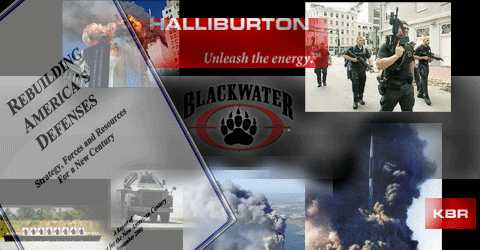Apart from the fact that no reasonable human being would want Blackwater anywhere near were they live, why does a private mercenary firm need three bases spread all over the country? Why is a private mercenary firm accused of war crimes, who has withdrawn from their lobbying organisation for fear of an investigation into their professional conduct allowed to train American police officers? There are only a thousand Blackwater mercenaries in Iran, so what else do they do on those bases? And let’s not forget that they also have a fourth base in the Philippines.(Travellerev)
Blackwater keeps its eye on a tiny East County enclave.
By Pat Sherman 10/09/2007
Blackwater USA Vice President Brian Bonfiglio flashed a self-satisfied smile, gazing east across Round Potrero Road where, on Sunday, more than 200 Potrero residents and antiwar activists streamed onto an adjacent parcel of land. They had come-some from as far as Ventura-to protest the 824-acre paramilitary training facility the company hopes to open a mile down the snaky dirt road.”I don’t think the war profiteering signs are appropriate, quite frankly,” Bonfiglio said. “At the end of the day, this will be determined as a land-use project by the [San Diego County] Board of Supervisors.”
As the public face of the project-dubbed Blackwater West-it’s Bonfiglio’s job to sell the facility as a non-invasive windfall to the residents of Potrero, a rural hamlet 45 miles east of San Diego. Given his employer’s image as a supplier of trigger-happy mercenary armies, unaccountable to neither the Iraqi nor American governments, wooing Potrero’s 850 residents has been a dicey game. Five members of the Potrero Planning Board who voted in December to support the project are facing a recall election. Some 320 residents signed a petition opposing the project that was sent to the county Board of Supervisors and Congressman Bob Filner, the Democrat whose district includes Potrero.
Read more
October 13, 2007
Categories: 9/11, All you need is a crazy rich guy with a private army, Blackwater USA, Cheney, Cheney's Gestapo, Concentration camps, Contractors, Economic meltdown, Fascism, Gestapo, Mass murder, mercenaries, Military-Industrial Complex, Nazis, Neo Cons, New world order, Private militia, War crimes, War profiteering, World war III . . Author: Travellerev . Comments: Leave a comment
 A Blackwater employee shows off a silencer-equipped rifle in Iraq in a photo obtained by NBC News. The picture has been digitally altered to protect the identity of the subject.
A Blackwater employee shows off a silencer-equipped rifle in Iraq in a photo obtained by NBC News. The picture has been digitally altered to protect the identity of the subject.


![[Image]](https://i0.wp.com/cryptome.org/cia-dirty-spy.jpg)


You must be logged in to post a comment.